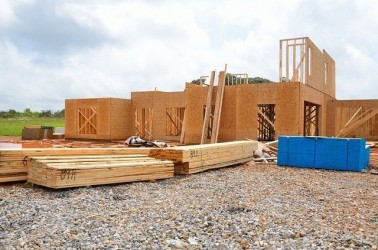What is a Construction Mortgage?
If you need to finance the building of a real estate project, such as a single family home or a multi-unit dwelling, you’ll need to take out a construction mortgage loan. These mortgages have short terms because they are designed to cover project costs ahead of long-term funding for the property. In comparison to many other types of mortgages, construction loans carry greater risk, so they will also have greater costs.
If you obtain a construction mortgage, it’s likely you are a builder or an owner of land that is looking to build his or her own home. The period generally does not run longer than 12 months. Once the construction is complete and you don’t intend to sell to an end user, you will need to secure refinancing with a traditional mortgage to pay off the construction mortgage loan. In some cases, you may only have to make interest payments while the construction project is ongoing. However, in other cases, the lender will have the mortgage payments prepaid from the proceeds and request for the entire balance to be paid in full by the end of the term.
What are the 5 key differences between a private construction mortgage and a traditional construction mortgage?
- Like we said – the risk is higher, so the interest rate will be too. You can anticipate a rate between 8 and 10 percent plus fees and other closing costs.
- Another difference is that you’ll have to accept a lower loan-to-value (LTV) ratio than you would get with a traditional mortgage. In urban markets, you can only get a 65% to 75% max LTV ratio. That means that the loan can only be 65 to 75 percent of the completed appraised value of the property. In a rural market, your max LTV ratio is likely 40% to 55% of the appraised value. If you have other real estate equity to put up as security, then a lender may have more flexibility.
- With a private construction loan, you also have a more flexible draw schedule. When you take out a traditional mortgage, the balance of the loan is paid to the seller of the property, and then you start making regular payments on the principal and interest. In a construction loan, you can receive more advances after you get a progress report by the appraiser. The fees for those reports generally range from $150 to $250.
- Another area that offers greater flexibility is the project start date. Banks that issue construction mortgage loans generally only work from start date to finish date. Private lenders are much more likely to accept a deal on an existing project, assuming that the LTV ratio falls within their guidelines, the borrower has the means to get the project finished, and the location is favorable in terms of real estate value.
- There are several different types of projects. One is the self-build, but in that case, the builder must be qualified to act as his/her own general contractor. There’s also the self-build with a general contractor. In this case, the homeowner is also driving the construction but has a general contractor along the way to manage the project. Some projects use a residential builder; in this case, the home buyer signs a contract with a home builder to purchase a custom home. The last type is prebuilt/RTM. In this case, there are several requirements to consider, such as ensuring that the home is connected to a foundation and other construction baselines.
If you find yourself in the market to build your family’s dream home but haven’t been able to get the help you need from your bank, or if you are in the middle of an ongoing construction project and the money is starting to run out, and your bank isn’t helping you, apply with us with our no-credit check initial prequalification. We’ve helped clients in your position and look forward to determining what we can do for you.

